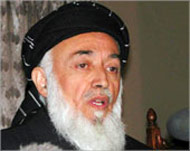Burhanuddin Rabbani
Despite his chequered record as former president of Afghanistan, Burhanuddin Rabbani, could very well be a front-runner in the upcoming presidential elections
|
|
|
Burhanuddin Rabbani |
Burhanuddin Rabbani, a man of strict religious convictions and progressive ideals, receives mixed reactions from people on the streets of Kabul.
Rabbani was raised in his native province of Badakshan; he later went on to study Islamic Law and Theology at Kabul University where he was then employed as a professor at the age of 23. Further studies took Rabbani to Cairo where he completed a master’s degree in 1968 in Islamic Philosophy at the respected Al-Azhar University.
He catapulted to power in 1988 after the Soviet army started leaving Afghanistan. Rabbani became president after the ten-year war, which claimed 1.3 million casualties. Rabbani managed to cling on to power for four years before a group of mujahideen fighters overthrew the Russian-backed government. However, Rabbani was nominated to serve as president in a rotational style government in 1992. His term was to last for one year; though when his term ended, he refused to step down.
As a result of Rabbani’s refusal, his political rival and prime minister, Gulbuddin Hekmatyar began an extensive military campaign throughout the country. But Rabbani’s Jamiat-e-Islami party was able to hold Kabul despite the ongoing shelling and killing, which resulted in the deaths of 25,000 people. This subsequent fighting gave rise to the Taliban in 1996. Before becoming a threat to Rabbani’s leadership, at one point he referred to the Taliban as, “the doves of peace.”
Rabbani, an ethnic Tajik, was forced to retreat to his birthplace village of Faisabad in the north of Afghanistan when the Taliban came to power. It was there where he would wait for his opportunity to lead to come again. But it never did.
After the ousting of the Taliban many Afghanis still felt that Burhanuddin Rabbani was their rightful leader. But the US purposefully overlooked him for a rival, Hamid Karzai.
To outsiders, the relationship between Karzai and Rabbani
 |
|
Rabbani has yet to announce |
appears cordial and of mutual respect. However, sources close to both men admit that this is nothing short of a facade. Publicly, Rabbani and Karzai state that their relationship is paternal, Rabbani is calls Karzai his ‘son’ while Karzai refers to Rabbani as his ‘father’. The reality of the situation is not so pleasant, however. There are clear animosities between the two as Rabbani views Karzai’s government in disdain, since external forces implanted it. Karzai, on the other hand, believes Rabbani is a threat to his presidential legitimacy. Elections are set to be held in summer 2004.
Rabbani’s critics steadfastly suggest that his leadership would cause deep political divisions within the different factions of the Afghani political spectrum. But the same critics also acknowledge that no leader can claim to have the kind of following and respect that Burhanuddin Rabbani enjoyed. The soft-spoken academic is known for his devoted religious beliefs, but more importantly his traditional, tribal rule that appeals to the numerous Afghan villagers.
Many Afghanis remember the days of Rabbani’s rule where he would make time to meet with anyone who desired to meet him. There are countless stories of Afghani farmers or villagers who would travel from distant towns and villages to simply have a few minutes of his time. Rabbani responded to such meetings by hosting any given constituent with a cup of tea and a relaxing afternoon where they would discuss any issue concerning that visitor. However, his talent to offer time, eloquent words, and hope to his countrymen never translated into real action.
Nevertheless, Burhanuddin Rabbani will be a serious challenger, if not front-runner, in any future elections scheduled to take place in the coming months.
